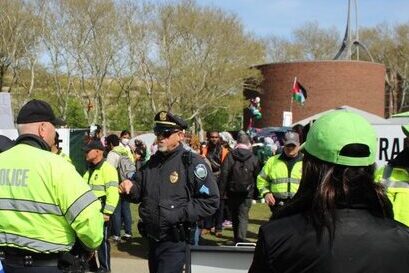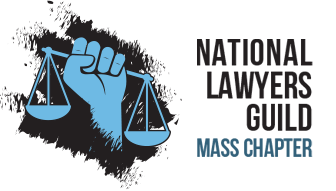Tufts University

Coordinating LOs at the Tufts encampment was often a question of risk management and vigilance. This was one of the longest campus lived-encampments, going from April 7th to May 3, 2024. It wasn’t uncommon to watch a high-tension situation for hours – or for that matter a low-tension situation – waiting to see if we should change the risk level, ask more LOs to join, or dismiss for the day to wait on standby. It was a situation where no one had complete information and we had to make the best decision with information gathered from organizers, community members, and sometimes even anonymous sources.
As LOs, while there were so many other protests going on, we also had to be aware of resource management, whether making sure LOs got rest and or knowing where the greatest needs were in all of the encampments or actions over an area. That was the biggest difference in LOing for the encampment versus LOing for a single action – it felt like we were a unified group that could be deployed at times and places of greatest need. We ended up maintaining most of the Tufts encampment LOing on standby after their major actions, so that more resources could go to volatile situations at some of the other encampments in the Boston area.
The biggest takeaways I got from coordinating was the importance of communication, trust, and taking initiative. Coordinating LOs was not any kind of hierarchical relationship. I coordinated some days, and simply acted as an LO others. We were all just volunteers who had slightly more time on a given day or set of days, and I’m so grateful to all of the LOs that were able to work together. It truly became a community, people that I was able to trust to show up when they were needed and who were working towards a common goal – protecting people and protestors in the encampments and helping them feel safe, in a carceral society that devalues the voice of the protestor and often tramples over their rights.
Putting on that green hat meant that admin, police, and other surveillance and enforcement actors were aware that they were being watched and would have to be careful and treat protestors with more respect. There were times we were asked for advice, general legal questions, and the purpose of our role as LOs by community members or bystanders. Though we often could not answer their questions and had to disabuse some of the notion that just because we had legal in the name did not mean we could give them legal advice, I was glad that they were aware we were there and felt safer. Overall, I hadn’t seen such unity of purpose and community in university spaces before and it was truly a privilege to be one small part of this work.



